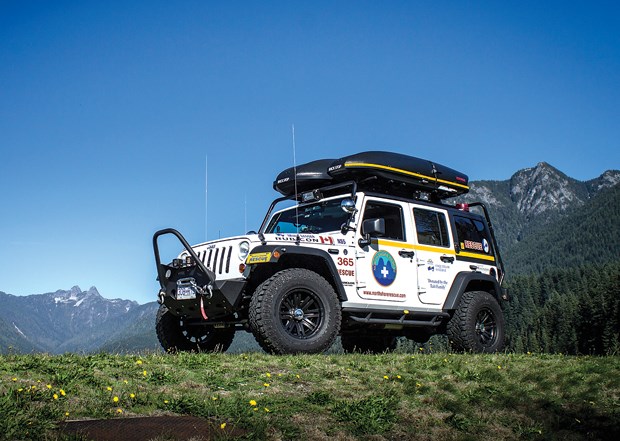This time, when the call came in, it was the community that came to the rescue.
North Shore SAR volunteer Jay Piggot had been diagnosed with a rare form of cancer, meaning he'd be out of work while undergoing chemotherapy. North Shore Rescue put out a call to the public for donations to help.
In the space of one week, they had their answer.
The fundraising goal was achieved and surpassed by last Friday (you can still help at rescuetherescuer.ca or at BlueShore Financial), many of the donations coming from anonymous sources. Piggot and the North Shore Rescue team declare themselves floored, flabbergasted, overwhelmed by the response.
They really shouldn't be. While the odd meandering tourist in a T-shirt might not know the kind of dedication and personal sacrifice it takes to be on the team for North Shore Rescue, most of us on the North Shore do. We've seen the house that Tim Jones built, we've read the stories of three and four calls out in a weekend for the purely volunteer force, we've heard the helicopters headed out to pluck somebody out of danger. If you live here, you already know, so the response from our community isn't a total surprise.
However, aside from times when the call goes out, it's easy to take North Shore Rescue for granted. For me, the realization of what they do didn't really hit home until I was walking my daughter to school and passed a neighbour's house.
"Look, Papa!" she said, pointing at a white painted, heavily laden Jeep Wrangler outfitted for backcountry work. It was North Shore Five.
Tucked away in a garage at their headquarters just beside the city works yard, the vehicles of North Shore Rescue sit ready to go. All of them have call signs (NS5, NS6, and so on), and most of them have names too.
NS5, a 2012 Jeep Wrangler donated by the Tate family of West Vancouver, carries the nickname "the Mule Legger" painted on its hood. Nearby, a Ford F-350 set up for offroad ambulance duties is called "Knuckles."
The latter is named for the late Tim Jones, the leader who turned NSR into a professional (if unpaid) service. The former is for Johannes Mullegger, a young volunteer who died in a training accident. Nearly every machine here is part memorial to past North Shore Rescue volunteers.
The Wrangler is a tough backroad machine, capable of getting out into the watershed pretty much anywhere there's even a trace of a road. It can summit Mount Strachan to resupply the caches, and be used to transport foot search teams close to where they're needed. They call it the Mule because it's so overloaded with gear - Johannes always reached for the heaviest pack.
There are four main vehicles here, one an International Harvester command post currently being refurbished. With fixed communications and supply caches throughout their coverage area, NSR doesn't need to rely on a mobile post most of the time, although the search leader often has to squash into Knuckles or the Mule and co-ordinate from there.
There's also a fleet of snowmobiles and ATVs, though NSR's go-to machine is still the helicopter. No other vehicle is as good at getting into backcountry quickly as a helicopter, and the team has a partnership with Talon helicopters.
Getting a whirly bird in the air isn't cheap, and NSR prefers not to charge for rescues - they feel it'll make people wait too long to call for help, until they're really in trouble. Thus, there's a lot of fundraising to be done, with the bulk of the team's operating costs being covered outside of government funding.
And beyond the dollars raised by the community, there's the thousands of hours put in by the volunteers themselves, a sea of red coats just like those that descended on Piggot's home to help get the chores done, the dog walked, the groceries bought. They are your neighbours, part of the community and part of something bigger at the same time.
So don't get used to glossing over the rescue reports and clucking your tongue at ill-prepared tourists. We all live in these mountains and enjoy them, out on the trails with our kids and our dogs. Remember the people who work so hard to make our wilderness a safe place to play; but then, judging from your response when one of them needed our help, you probably didn't need a reminder.



